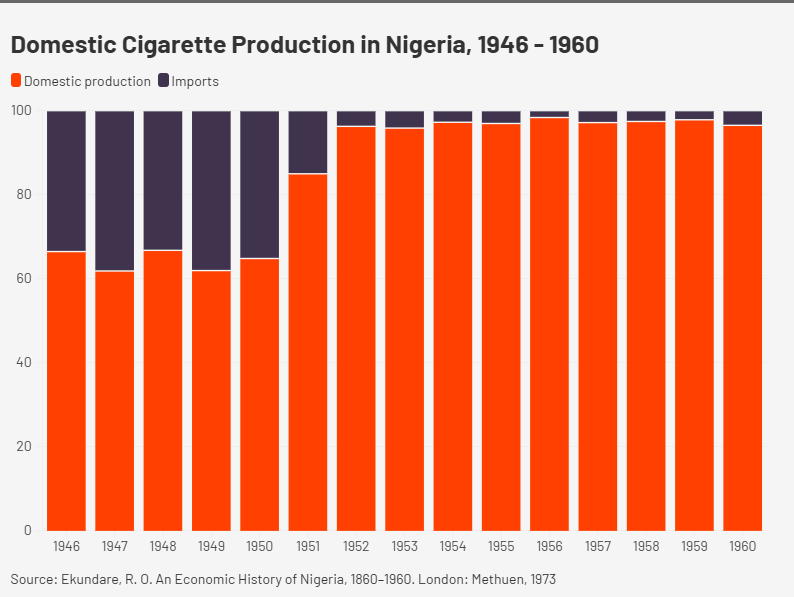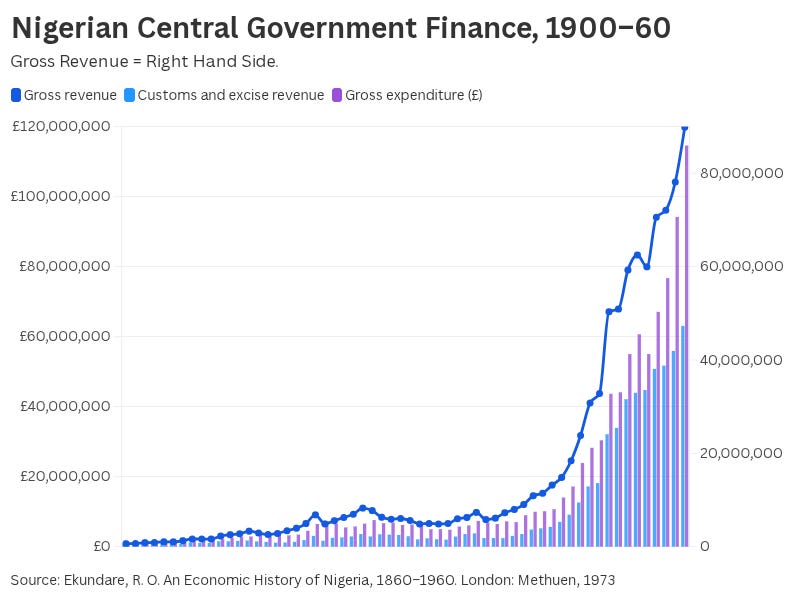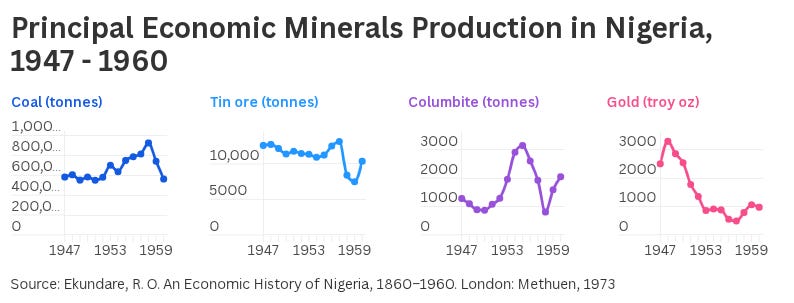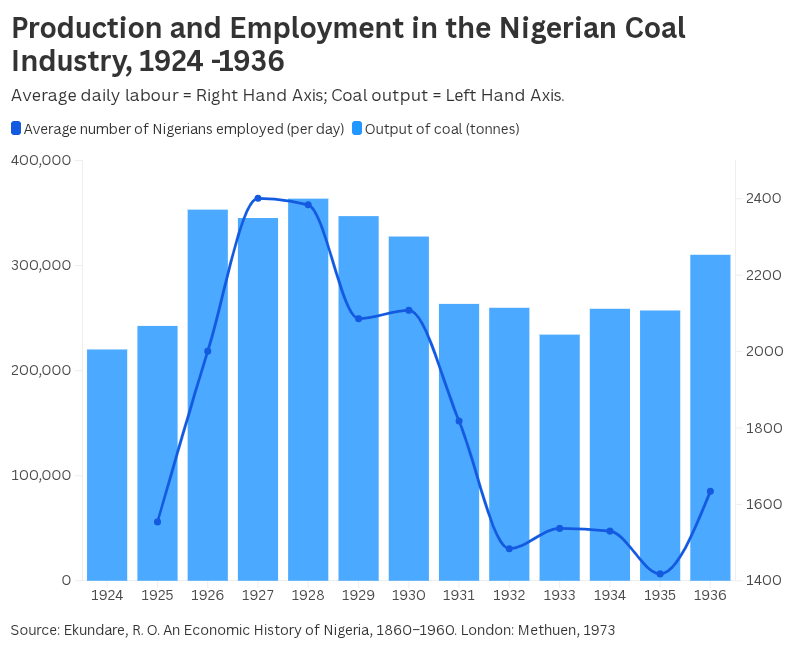The first recorded flight of an aeroplane to Nigeria was in 1925 when a Bristol Fighter aircraft of the Royal Air Force visited from Cairo.
The rise of non-UK ships reflected both the recovery of trade with Germany and the Netherrealms (nee lands) but also port improvements to the Lagos port and the construction of, well, Port Harcourt.
Well. . .commercial vehicle registrations bounced back, lol. But the drop presaged future struggles to afford industrial imports on a commodity exporters’ income.
Corporate earnings, in general, were falling, and UK firms were leaving as the Air Nigeria prepped to land on independence way. Much about the First Republic is reduced to Major Nzeogwu’s big for nothing ten percenters speech, but the country was, metaphorically, going to the dogs in many ways beforehand. The politicians’ promises would get mugged by reality.
If you knew a Nigerian smoker in the 1960s, their vice was made in Nigeria!
I know I could clean this up more, but you get the idea. Britain shrank from indispensable to nullity as Nigeria shifted towards being primarily a crude oil exporter. You can also see the Dutch (Unilever etc) and Germans pull back too.
Our export markets are more diversified than they were at the start of the Fourth Republic. Although much of that has to do with the globalisation of crude oil and gas markets, as well as the spread of machinery.
The Mercedes and Peugeots that ruled the streets in my childhood memories explain the Franco-German trading relationship, and, of course, there was no computing without the USA in those days.
The chart below provides a flavour of the variety of our imports from the UK.
I can’t speak for cotton (how?!) or perfumes, but our reliance on them for machinery makes some sense given the fact that our electrical standards (and such) are the same! 220v and properly shaped sockets FTW!
Railways were to the steam GPT what IBM was to computing and Microsoft to software. However, the industry in Nigeria was difficult to establish in Nigeria. The elements quickly eroded invested capital, and only increasing freight exports from Northern Nigeria could subsidise its use for passenger transport.
Also, with the benefit of hindsight, subsidising road transportation came at rail’s expense.
P.S. Pay attention to the y-axis. Freight earned in the millions, while the rest were much lower!
Roads, as I alluded to, became a rapid source of competition for rail transport for both passenger and freight haulage. And, as we know, roads prevailed. Of course, that spun out a whole other web of complexity — what with the need for road maintenance and the importation of parts, fuel and whatnot.
Expenditure and Revenue were rising up to 1960, but the relative stagnation of customs revenue was the canary in the coal mine. The government was ultimately able to muddle through by strangling the commodities board and borrowing. Luckily, the civil war and oil brought respite.
Speaking of borrowing. . .these days, most government debt is from domestic sources. But, once, we were once all foreign. Funding the railway was the initial reason for tapping the markets.
Freight subsidised transporting people. Nigerian rail died alongside freight demand. Something to keep in mind during the current debt-fuelled rail-naissance.
Nigerians paid for all the £222,585,455.00 invested in the rail lines. The rising costs reflected upgrades to rail tech —faster models, switching the tracks from wood — beloved by termites — to steel etc. But you can see how that was quickly becoming a burden. For a sense of perspective, £222,585,455.00 in 1938 pounds is £12,980,010,479.21 in 2025. Thirteen billion pounds is N27tn at the current exchange rate. That is about half of 2025’s historically massive FG budget spent over two decades on rail alone.
We weren’t big minerals exporters or even producers, frankly. Most of the coal was slated for domestic use in the thermal plants and rail engines. Something to keep in mind when the Nigeria without oyeh propagandists go their tirades. Yeah, we’d prolly be Burkina Faso.
Like I wrote — until crude came along, cash crops were all she wrote. And at <200m pounds, that wasn’t going to be very sustainable, especially taking into consideration all the promises the politicians made. For more perspective, total exports in 1960 were 117m pounds sterling. That is around 2bn pounds or 4tn Naira today. No 54tn budget on that income! Thanks, crude oil.
Staff of the most technologically advanced part of the Nigerian economy. I doubt any single private company maintains these numbers today. And, yes, I am aware that best practice would outsource most of these functions. But still . . . impressive stuff!
Why the Malaysians and Indonesians ended up outproducing Nigeria in one image. Things might have been different if the decline had stopped at two acres. I wonder what updated numbers look like.
Not much to say on coal. Just know that its days were numbered once the rail engines switched to diesel and thermal plants adopted gas. As we’ve seen, it never garnered much of an export market, and production never amounted to much. For reference, China produces 4bn tonnes of coal per annum. 400k-ish tonnes isn’t even Sunday League!
Star is made in Nigeria, but I guess it couldn’t compete with whiskey and the German stuff.
I prefer really not to speak. If I speak, I am in big trouble… and I don’t want to be in big trouble.
Hopefully, they stop cosplaying revolutionaries and do some hard thinking on the challenges of Nigerian industrialisation.
Much is made about Nigeria’s high import numbers. In some circles, it’s treated like a sin. They are wrong. Remember, every Naira generated in Nigeria is split between the government, Nigerians and foreigners (to the extent they contributed to making that Naira). I’ve never understood why so many claim to care about what the parties end up doing with the Kobos they worked hard to earn!
Anyways, we’ve been a deficit country for a long while! It comes with the territory. Anytime you see politicians celebrating a so-called surplus, just know that consumers have been squeezed and Nigerians are much worse off!
—----
If you made it this far, I guess I should write Thanks for your attention to this matter, lol. I wrote the thing and made you read for it — unlike Mexico and the US wall.
By the standards of wee, effete, soft-handed make-believe work, this was hard work. I probably could have stuck the landing better. But there are only so many ways to say that development is a hurdling marathon and not a sprint. Past a certain point, you gotta pull the pot off the stove and send the meal out to be judged. I hope you enjoyed reading it. If not — I’ll be better. I really hope so.
You can support my efforts in one of three ways:
Click the link to join my patrons, all of whom keep me off the farm. Contribute as little as you can, or as much as you wish. Trust me, no one wants me around hoes and mounds — for the crops’ sake and mine!
You can also share. Sadly, I watched Mad Men and learnt nothing. So I can’t sell water in a desert. So, I’m drafting you. Like every hero at the start of an RPG, it’s now on you to save my content world.
Send me material. My interests are vast and my capacity for boredom nigh infinite. Besides, trade is good!
I’ve got more in pipeline that would not be possible without your support. Thanks for reading. . .if anyone got this far.


























